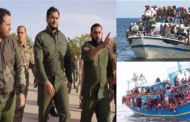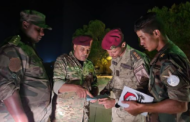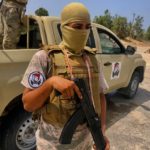Jan. 18, Slovak diplomat Ján Kubiš appointed UNSG Special Envoy to Libya.
Jan. 18, PM Al-Sarraj creates “Stability Support Apparatus” officially to protect state institutions, state officials; appoints controversial Abdelghani Belgassim, a.k.a. “Al-Kikli”, as its head; decision probably signals more conflict with Interior Minister Bashagha.
Jan. 19, blaze-triggered explosion at Janzour Naval Academy kills 3, including two Commodores, injures 4.
Jan. 22, CNN-published satellite images show giant trench between Sirte and Al-Jufra, reportedly dug by Russian Wagner Group mercenary, raising concerns over Russia’s readiness to withdraw mercenaries.
Jan. 23, HoR-HSC 13+13 Committee concludes Bouznika meeting with agreement on sovereign positions selection mechanism.
BENGHAZI
- Jan. 20, a source from Benghazi reported that the body of a businessman named Kamal al-Amami was found in Al-Zait Street, Benghazi, just days after the report of his kidnapping. The source, who preferred to remain anonymous, added that Al-Amami’s remains were found close to three other unidentified bodies. All bodies showed signs of torture and bullet wounds. Several bodies of Libyan civilians nhave been found in the same Al-Zait Street over the past three years;
KHUMS
- Jan. 22, the Libyan Coast Guard rescued 36 illegal migrants of varying nationalities as they attempted to cross the Mediterranean on a boat northwest of the coast of Khums. The Coast Guard disembarked the migrants at the Tripoli Naval Base where they were immediately provided with humanitarian and medical aid;

SIRTE – AL-JUFRA
- Jan. 22, the CNN published satellite images showing an enormous trench between Sirte and Al-Jufra, reportedly being dug by the Russian mercenary Wagner Group. The photos show trenches extending for over 70 km, from Sirte to as far as the Al-Jufra airbase, which are supported by a network of complex fortifications around the Al-Jufra base. The presence of such massive trenches raises concerns regarding Russia’s good faith regarding its withdrawal of Wagner mercenaries, as stipulated in the peace agreement negotiated by the United Nations;

TARHUNA
- Jan. 22, the Tarhuna mass graves inspective committee delivered 17 identified bodies unearthed from local mass graves to their relatives. The committee ensured that necessary samples from the remains were taken and preserved for future investigations;
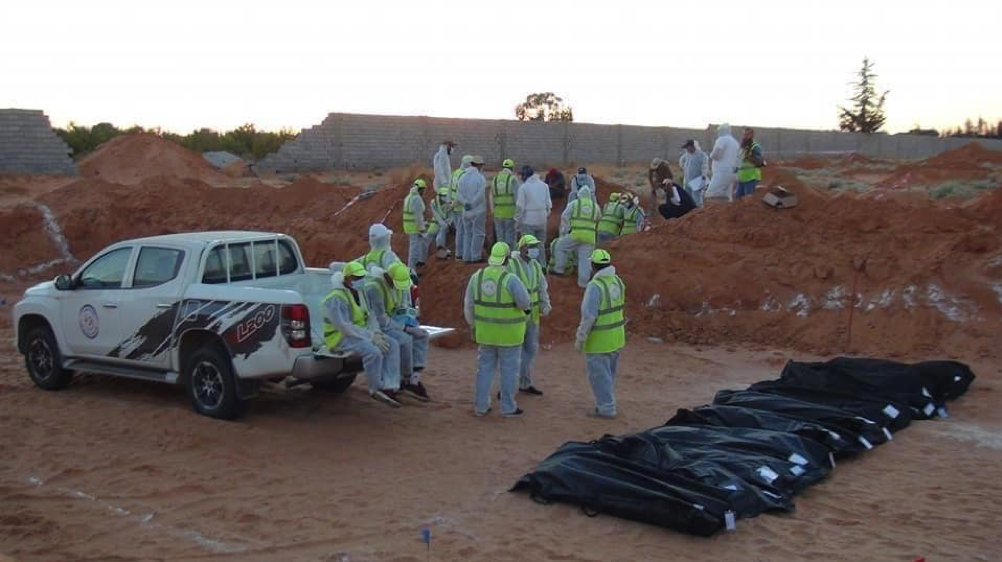
- Jan. 20, the remains of 10 unidentified persons were unheartened from a new mass grave in Tarhuna. Specialized teams are finalizing the necessary formalities after family members positively identified the dead;
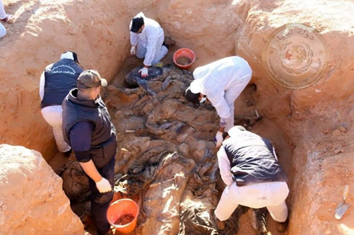
TOBRUK
- Petroleum Facilities Guard (PFG) members in Tobruk closed the Hariga oil port and blockaded oil exports over unpaid salaries. Jan. 24, the PFG members confirmed in a statement that the closure occurred after an agreed deadline expired without their salaries being paid down;

TRIPOLI
- Jan. 23, female inmates at the Tripoli-based Mitiga prison went on a hunger strike in protest at being held in custody for years without trial. A human rights watch following the case has called on the Attorney General’s Office to immediately release the women, who reportedly have never been officially charged;
- Jan. 19, three people were killed and four others injured in an explosion at the Naval Academy in Janzour, 24 km W of Tripoli. Among the dead were the academy commander, Commodore Ahmed Ayoub, and the commander of the college of maritime studies, Commodore Salem Abu Salah. A fire reportedly triggered the explosion, which in turn gravely damaged the warehouse;

- Jan. 18, PM Fayez al-Sarraj established a new security apparatus called “Stability Support Apparatus” to protect state institutions and headquarters as well as state officials, appointing Abdelghani Belgassim, a.k.a. Al-Kikli, as its head; and Ayoub Abu Ras, Hassan Abu Zariba, and Mousa Mahmoud as his deputies. The apparatus will also take part in security operations such as police raids and apprehensions related to national security in coordination with the relevant authorities. Al-Sarraj’s decision has been seen as a new episode in the behind-the-scenes conflict with his Interior Minister Fathi Bashagha, who has hopes for becoming the next Prime Minister.
ZAWIYA
- the Libyan Coast Guard rescued 79 migrants of varying nationalities approximately 12 nmi N of Zawiya, Defense Minister Salaheddin al-Namroush reported Jan. 24, adding that 64 men, 13 women and one child were saved, and one body was recovered. All the rescued were handed over to the Anti-immigration Agency.
INTERNATIONAL RELATIONS
- Jan. 23, the Libyan House of Representatives (HoR) and High State Council (HSC) 13+13 Committee concluded a two-day meeting in Bouznika, Morocco, agreeing that Libya’s top sovereign positions will be distributed according to regional and meritocratic criteria, in compliance with Article 15 of the 2015 Skhirat Libyan Political Agreement (LPA) which prescribes that all top sovereign Libyan positions must be agreed by the HoR and HSC through their joint Committee;
- Jan. 22, Russia’s Deputy Foreign Minister, Mikhail Bogdanov and the newly appointed UNSG Special Envoy to Libya, Ján Kubiš held a telephone conversation focused on a range of issues relevant to the Libyan crisis;
- on 21 January, UNSMIL announced that the co-chairs of the International Follow-Up Committee on Libya’s Economic Working Group (EWG), including Acting Special Representative of the Secretary-General for Libya Stephanie Williams and representatives of Egypt, the United States and the European Union, convened a meeting to discuss urgent economic issues, including the impacts of a unified exchange rate as well as the need to unify and consolidate a national budget;
- Jan. 20, UNSMIL acting head Stephanie Williams warned Libyan politicians not to bypass the Libyan Political Dialogue Forum (LPDF) or try to set up “a rival”, stressing that any attempt to form a new executive body must be under the umbrella of the LPDF;
- Jan. 20, during a virtual meeting between US Ambassador to Libya, Richard Norland and Emad Al-Sayah, head of Libya’s High National Elections Commission (HNEC), the US side reaffirmed its support for Libya’s elections scheduled for 24 December 2021;
- Jan. 21, the governments of France, Germany, Italy, the UK, and the US welcomed in a statement the Libyan Political Dialogue Forum (LPDF)’s vote in favor of the selection mechanism for a new interim executive authority, which will guide Libya toward national elections on Dec. 24, 2021. The countries also welcomed the UN Secretary-General’s appointment of Ján Kubiš as the new UNSG Special Envoy to Libya;
- Jan. 19, the EU Delegation in Libya and the diplomatic missions of EU Members in Libya issued a statement praising the LPDF for approving a mechanism that will determine the selection of Libya’s next temporary interim government;
- Jan. 19, the joint HoR and HSC Constitutional Committee started its second meeting in Egypt’s Hurghada. UNSMIL reported that the meeting consisted of 10 members each from the two bodies. The joint Constitutional Committee is a creation of the 2014 Libyan Political Agreement (LPA). The meeting has convened to discuss the constitutional arrangements necessary for holding the planned 24 December 2021 elections;
- UNSG António Guterres urged the departure of all foreign fighters and mercenaries from Libya by Saturday as called for in the Oct. 23 ceasefire agreement signed by the warring sides after years of fighting. also urged the Libyan warring parties “to maintain their resolve in reaching a lasting political solution to the conflict, resolving economic issues, and alleviating the humanitarian situation”. As of yet, however, there have been no signs of any serious evacuation of foreign fighters;
- following a four-day meeting of the Libyan Political Dialogue Forum’s Advisory Committee in Geneva, Stephanie Williams logged in to an AI-powered chat to engage in a digital dialogue with 1,000 Libyans, the majority of whom hailed from all regions of the country, with the remaining participating from abroad, according to UN. Williams welcomed the high level of engagement and interaction by participants as they answered questions on the political, security, and economic situation in the country;
- Jan. 18, UNHCR expressed concern about the COVID-19 risks facing migrants held in detention centers in Libya. The UN agency also revealed that it has helped support the transfer of all migrants detained in the southwestern Libyan city of Zintan to the capital Tripoli upon their release by authorities. Most had been detained for more than two years in extremely dire conditions;
- Jan. 18, UNSG António Guterres announced the appointment of Ján Kubiš of Slovakia as his Special Envoy on Libya and Head of the United Nations Support Mission in Libya (UNSMIL). This position is established pursuant to Security Council resolution 2542 (2020), the UN reported. The UN reported that the Secretary-General is grateful for the commitment and outstanding leadership of Acting Special Representative Stephanie T. Williams of the United States in moving the political process forward in Libya. Williams had been Acting UNSMIL head after the resignation of Ghassan Salame in March last year.


